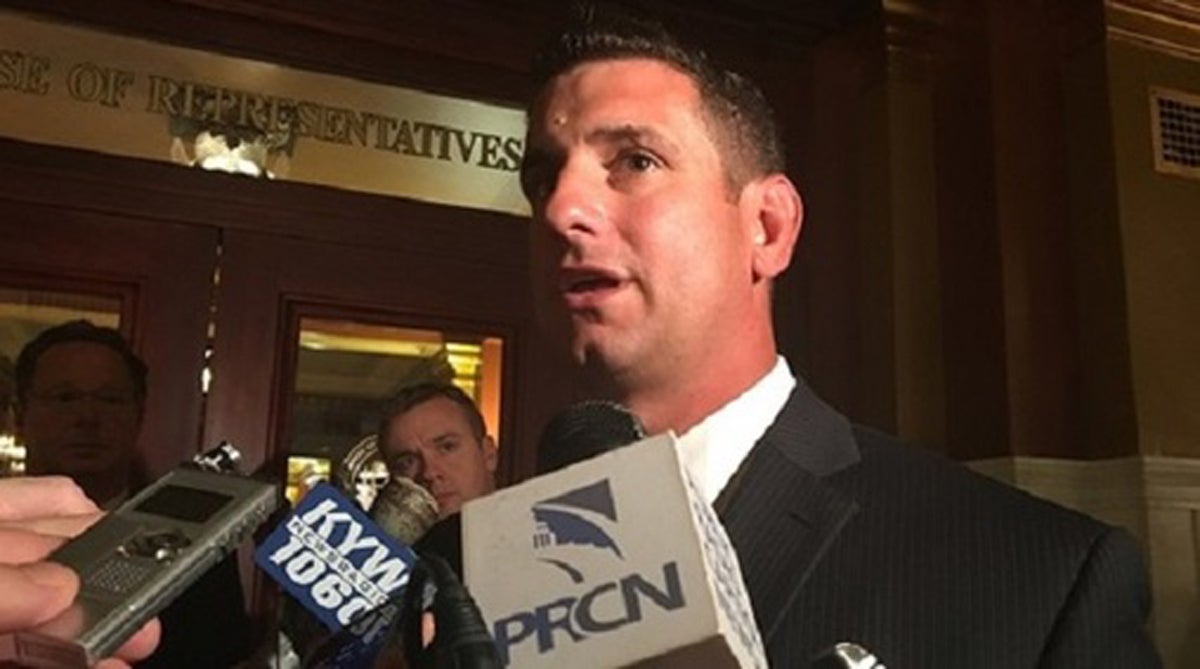For the second year in a row, Pennsylvania passes an unbalanced budget

House Republican Leader Dave Reed speaks to reporters after Wolf's announcement that he'll let the unbalanced budget pass. (Katie Meyer/WITF)
Governor Tom Wolf has allowed an incomplete state budget to become law without his signature after a marathon negotiating session yielded no agreements between his administration and GOP leaders.
Talks broke down over a few hundred million dollars of revenue out of the $32 billion spending plan.
Nearly $30 billion of the 2017-18 package is already accounted for. It’s the remaining $2 billion or so that’s causing lawmakers a headache.
Leaders say they have more-or-less agreed to plug most of the gap though fund transfers and borrowing. But that still leaves several hundred million dollars for them to fill, and there’s no consensus on how to do it.
“I thought we were nearing an agreement over the last couple days,” House GOP leader Dave Reed said. “But when things kept going in the wrong direction and the last offer took almost 20 hours before we heard back from the administration not accepting that offer, I’m not so sure that people were actually serious about getting an agreement from the governor’s perspective.”
Reed said the administration is asking for a few hundred million dollars more in recurring revenue than Republican leaders can come up with, since they don’t want to raise any taxes, and haven’t had luck getting major gaming and liquor expansions off the ground.
He accused Wolf of moving the goalposts during negotiations.
“The governor always wants more,” he said. “Always more spending, always more taxes, I mean for goodness sakes the first year it was 12 billion dollars in new taxes…every time we made an offer, the governor came back with more taxes and more spending than the previous offer.”
Wolf hasn’t made any public appearances in the last few days.
In a statement, he said his push for new revenue has been largely prompted by rating agencies’ threats to downgrade the commonwealth’s credit if its budget isn’t truly balanced.
A letter from Standard and Poor’s last week warned that “Pennsylvania’s chronic misalignment and eroding general fund position, particularly during a period of economic growth, demonstrate a pattern of financial mismanagement.”
House Democratic Leader Frank Dermody backed Wolf’s position.
“Recurring revenue is something that all the rating agencies believe we need to do,” Dermody said. “We just saw Illinois do that when they were threatened with junk bond status.”
He added, “The cost of borrowing could go up by tens of millions of dollars in the commonwealth, and that’s part of the way we do business.”
Reed said the House intends not to pass a portion of the budget known as “non-preferred” appropriations—a roughly $600 million pool of cash that goes to public universities.
Without that spending, the budget could technically be balanced if all the code bills pass. The money is often used to help universities pay for reduced tuition rates for in-state students.
As talks continue between GOP leaders and the governor Tuesday, the rest of the assembly will be working to pass companion bills that contain the bulk of the budget’s revenue language.
House Speaker Mike Turzai indicated that his chamber will recess indefinitely afterward, whether or not the budget is passed. But other leaders have said nothing is certain yet.
WHYY is your source for fact-based, in-depth journalism and information. As a nonprofit organization, we rely on financial support from readers like you. Please give today.


